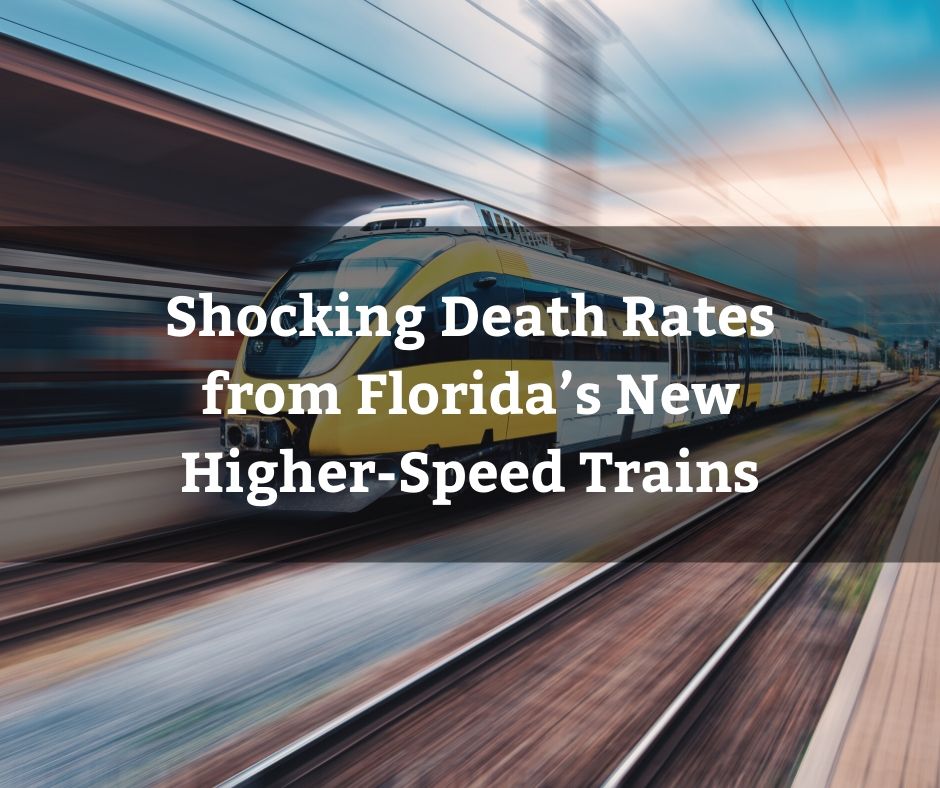
Early last year, the Brightline railway service was officially launched in the state of Florida. Every day, the high-speed railway company runs around 17 trains back and forth from Miami and West Palm Beach. The company has plans to expand their service to Orlando in the coming years. While Brightline may have made the trip easier for its passengers, it’s not all good news. An AP report revealed that the company’s trains have the highest death rate in the country.
Higher Speed, Higher Fatality Count
Brightline is a fairly recent addition to our state. The trains made their official debut in Florida early last year. Tragically, their first fatality came even before they opened the railway service to the public. Starting in 2017, the company began to rack up a death count during initial test runs.
The Brightline trains are considered to be “higher-speed” trains. These trains currently reach speeds up to 79 mph as they whisk through densely populated Florida cities. Many true high-speed trains reach speeds up to 160 mph. If the company’s plans to expand to Orlando in the coming years succeed, some of the new sections they travel will see the trains reaching speeds of 125 mph.
While zipping around the state of Florida may be much more convenient for some travelers, it has already come at a cost. An analysis conducted by the Associated Press shows that Brightline currently has the highest death rate in the country. The company’s trains currently average more than one death a month and about one per 29,000 miles traveled. That’s especially shocking when you compare it to other companies operating in Florida:
- Brightline: 1 death per 29,000 miles traveled
- Tri-Rail: 1 death per 110,000 miles traveled
- Florida East Coast: 1 death per 160,000 miles traveled
What’s Causing This Death Disparity?
Tragically, you might already have a couple of guesses for where many of these deaths are coming from. According to reports, the majority of these deaths have been suicides. Trains in our country kill around 800 people every year. Of that 800, around 500 are believed to be suicides. The remaining deaths are usually made up of distracted, impaired or impatient drivers. Many are found to have had alcohol or other substances present in their body at the time of their deaths. Others chose to risk their lives in the hopes of saving a couple minutes on their driving time.
Fortunately, none of the deaths at the hands of the Brightline trains have been due to operator error or mechanical failures. Still, something clearly needs to be done about this issue. The company, to its credit, seems to be taking the issue very seriously. Some of the measures they’re exploring include: infrared motion detectors, drones to patrol tracks, erecting fences and barriers in problem areas and working with suicide prevention groups.
Keeping Safe Near Railway Tracks
It’s undeniable that the suicide-related deaths are tragic. They have lasting effects on the families of the deceased and take a serious toll on the train operators. However, these aren’t the only lives being lost on Florida railways. Every year, we lose hundreds of people who had no idea they wouldn’t make it home that day. Or if they did, that they’d suffer from life-changing injuries.
Many of the deaths and injuries in train-related crashes were due to impatient drivers. People who were willing to put their lives on the line to try and make it home a bit earlier or because they were running a little late to the office. Are a few extra minutes worth your life? Of course not.
Others died while being distracted or impaired. The fact is, all of these deaths were completely avoidable. Slow down. Pay attention. Focus on the road. Don’t drive while impaired. As long as we all are willing to follow these simple guidelines, there is no reason for as many people to lose their lives to railway-related incidents every year.













